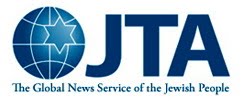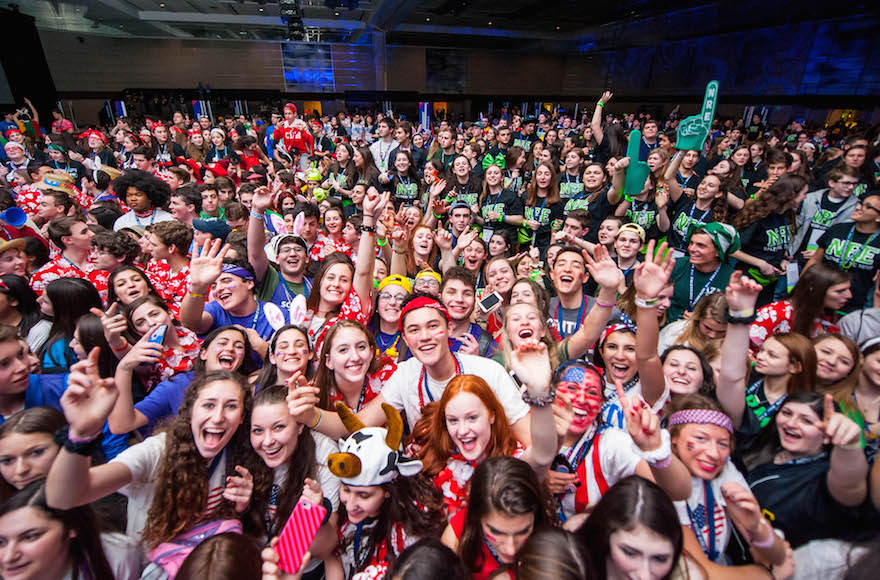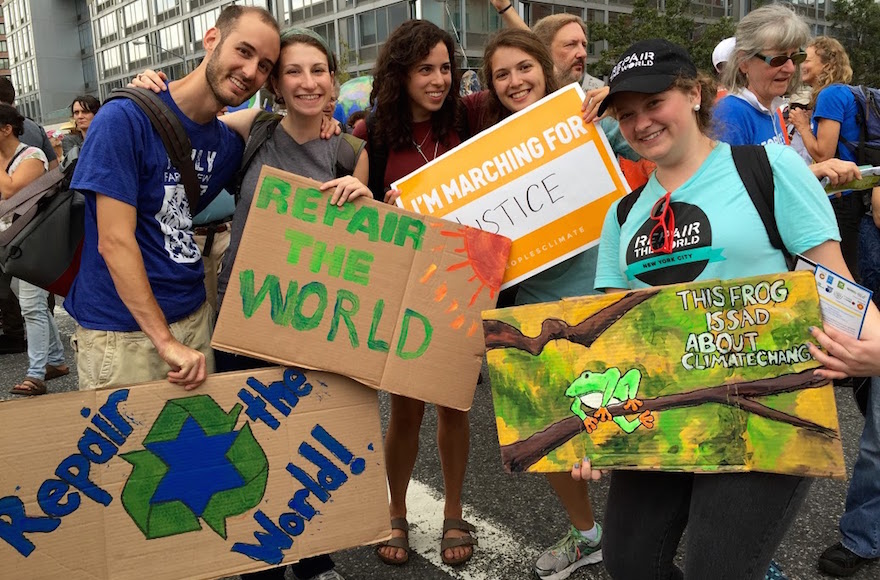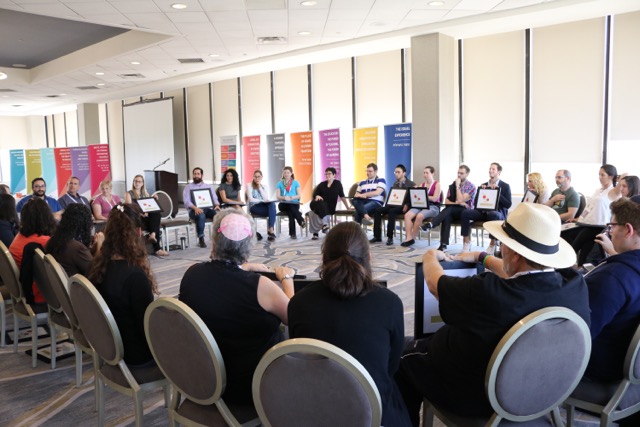 Earlier this year, Barry Chazan, professor emeritus of education at the Hebrew University of Jerusalem, penned an op-ed for the New York Jewish Week in which he discussed the 21st-century shift toward personalization and customization.
Earlier this year, Barry Chazan, professor emeritus of education at the Hebrew University of Jerusalem, penned an op-ed for the New York Jewish Week in which he discussed the 21st-century shift toward personalization and customization.
“Mattresses, automobiles and worldviews that speak to ‘my’ tastes, desires, interests, schedule, and way of thinking and living in the world,” wrote Chazan.
His argument was that up until now, the focus of Israel education has been on what is good for Israel, the Jews, and Jewish continuity. Today, however, the way we teach Israel has shifted with the way we teach and experience everything else.
“Israel is not the subject of Israel education—rather it is the one learning about Israel,” Chazan wrote. “The content of Israel education is not Israel—but rather the relationship with Israel. The aim of Israel education is not Israel—but rather finding a meaningful role for Israel in our lives.”
Chazan’s outlook is the same one that served as a spark for the formation of the innovative iCenter program, which invests in Israel-focused professional development opportunities for educators that work at camps, day schools, synagogues, on Taglit Birthright trips, and more. The iCenter, according to its website, is a national hub and catalyst for building, shaping, and supporting the field of Israel education.
“We support educators across all settings and provide the tools to bring Israel into their students’ lives,” the website says.
Anne Lanski, executive director of iCenter, told JNS.org that her team is working to shift educators’ mindset from one of curriculum and information to a focus on the learner—so that students begin to understand Israel and information about it “in the context of something relevant and meaningful to them.”
Lanski said that when education focuses on an issue—the people of Israel, the issue of Israel, how to deal with that issue—it turns Israel into a “subject” and too often not even a positive one. The iCenter’s “Aleph Bet of Israel Education,” therefore, offers a set of core principles, approaches to content, and pedagogies that the center hopes constitute the building blocks for the new-age field of Israel education. The goal is to change Israel education into an experience that becomes integrated into everywhere that Jewish kids are today.
“We used to say, ‘In what grade did you teach Israel?’ or, ‘Where does Israel live in your school?’ The answer would be like 6th grade, second semester,” said Lanski. “Now there is an understanding of the need for identity development and excellent education and a learner-centered education, and meaning that allows Israel to live organically in the lives of young Jewish kids in a way it didn’t before.”
One way the iCenter is fostering this transformation is through its iFellows Master Concentration in Israel Education, which to date has equipped more than 150 educators with the tools to employ a learner-focused approach to Israel education. The program includes rigorous academic study, ongoing mentorship, learning opportunities in Israel, and the creation of a final Israel education project. Following graduation, students join an alumni network through which the iCenter ensures the ongoing ability to share ideas, resources, and experiences.
Similarly, the iCenter’s Birthright Israel Fellows leadership program offers a growing network of young leaders who staff Birthright trips the opportunity to explore their own Israel stories, in order to ignite the passion they share for the Jewish state in their young travelers. Participants learn how to bring their stories to life.

Yaniv Havusha participated in a Birthright Israel Fellows seminar in March 2016. He said he learned how to share his personal Israel story, which centers on his parents—a mother who is an American immigrant and an Israeli father. The couple met just before the Yom Kippur War in 1973. As an American, Havusha’s mother faced a dilemma: stay in war-torn Israel with the man she loves, or return to safety in the U.S. Ultimately, she stuck it out in Israel. The couple made it through the war and later moved together to America, where Havusha was raised.
When Birthright groups visit Mount Bental, which overlooks Syria, Havusha now knows how to tell the story the way he sees it in his head: tanks, live action, and love. He shares pictures and letters written by his parents during that time and brings the circumstances to life.
“The goal is not have them (Birthright participants) become cheerleaders for Israel,” said Havusha. “It is just to start that ball rolling, to connect, to help them know what is [in Israel] and the impact it can continue to have on them when they return.”
At the Jerusalem U non-profit, Zeev Ben-Shachar’s role as director of Israel education has him using similar techniques to those of educators trained through the iCenter. Ben-Shachar is involved in developing Jerusalem U films about Jewish identity and Israel.
“We learned a long time ago, if you want students to connect, you have to connect to their minds and hearts,” said Ben-Shachar.
Caption: An event of the iCenter’s Birthright Israel Fellows leadership
program, which offers a growing network of young leaders who staff
Birthright trips the opportunity to explore their own Israel stories. Credit: Courtesy of the iCenter.
On such film is “Beneath the Helmet,” which tells a personalized story about the Israeli military through the eyes of combat soldiers on the ground, rather than only delivering the facts. “Inside Israel,” meanwhile, offers the tale of Israel as the so-called “start-up nation”—but rather than presenting a laundry list of key accomplishments and technologies, it demonstrates how the Jewish state has leveraged those technologies to make the world better, as seen through the eyes of the entrepreneurs themselves.
The other methodology employed by Jerusalem U is conveying critical-thinking skills to its students. Rather than exclusively promoting an Israel advocacy agenda, this approach centers on engagement and education, explained Ben-Shachar. His strategy is to provide students with all of the information they need, against the backdrop of a plan to transform them into pro-Israel advocates by educating about the difference between history and narrative as well as by teaching them best practices for unpacking the sometimes-biased news coverage on Israel.
“I believe that to support Israel is to have truth and justice on our side,” Ben-Shachar said.
The new LINK – Discovering Your Israel Connection curriculum of the pro-Israel education organization StandWithUs seeks to empower students to establish their own unique, modern connection to Israel by introducing them to the Jewish state in ways they could not experience through traditional Jewish education models, said Mina Rush, director of community engagement for StandWithUs.
“If the only Israel connection students are given is kachol v’lavan (the Israeli flag’s colors of blue and white) and falafel on Yom Ha’atzamaut (Israeli Independence Day), how can we expect them to meaningfully discern between clearly anti-Israel bias and the facts?” Rush asked. “The love, connection, and pride students should feel towards Israel must go beyond the superficialities of ‘feel-good Israel.’ What better way than to expose them to the best of what a nation built on Jewish values looks like? LINK addresses this through lessons on diversity, humanitarian aid within and without Israel, innovation and technology that improves the lives of people everywhere—all delivered with cutting-edge, interactive technology. The intent is to not whitewash some of the more complicated realities, but to first build a strong foundation of respect, connection, and pride before tackling them.”
The LINK curriculum is both project-based and experiential, using the same best practices recommended by the iCenter. It also adaptable, utilizing the latest technologies and devices as they emerge.
“School by school, camp by camp, community by community, we are embarking on a process of helping educators think intentionally and meaningfully about how they integrate Israel into what they are doing,” said the iCenter’s Lanski. “We think that after a decade, Israel will be experienced by the next generation like never before.”
“New models focus on the ‘I’ in Israel education,” JNS, July 7, 2016
 Two successful Jewish summer camps have announced plans to open new branches on the West Coast.
Two successful Jewish summer camps have announced plans to open new branches on the West Coast.
 Yedida Bessemer asked eJP readers
Yedida Bessemer asked eJP readers (
( “We believe that BBYO is uniquely positioned to ensure that the Jewish future is vibrant,” said Stacy Schusterman, co-chair of the Schusterman Family Foundation.
“We believe that BBYO is uniquely positioned to ensure that the Jewish future is vibrant,” said Stacy Schusterman, co-chair of the Schusterman Family Foundation.
 The Louisville Jewish Community Center has had a garden for years, but never the staff to make the most of it. For Michael Fraade, a member of the first cohort of Hazon’s JOFEE Fellowship who is spending the year working on the JCC’s environmental programming, that garden has the potential to change the ways in which members of the community understand the rich relationship between the earth and Judaism.
The Louisville Jewish Community Center has had a garden for years, but never the staff to make the most of it. For Michael Fraade, a member of the first cohort of Hazon’s JOFEE Fellowship who is spending the year working on the JCC’s environmental programming, that garden has the potential to change the ways in which members of the community understand the rich relationship between the earth and Judaism.
 The S.F.-based Jewish Community Federation raised $22.1 million in philanthropic gifts during its 2015-2016 fiscal year, funds that will provide services and programs focusing on Jewish life locally and internationally.
The S.F.-based Jewish Community Federation raised $22.1 million in philanthropic gifts during its 2015-2016 fiscal year, funds that will provide services and programs focusing on Jewish life locally and internationally.
 Earlier this year, Barry Chazan, professor emeritus of education at the Hebrew University of Jerusalem, penned an
Earlier this year, Barry Chazan, professor emeritus of education at the Hebrew University of Jerusalem, penned an 

 A new Early Career Fellowship Program will launch later this year to develop and position young leaders for careers in Jewish education. The pilot program is led by Gann Academy in Waltham, Massachusetts; Abraham Joshua Heschel School in New York, New York; and de Toledo High School in Los Angeles, California and is supported by a $1.5 million grant from the Jim Joseph Foundation. The grant is the latest example of the innovative high schools’ expanding leadership role in strengthening the Jewish community in their local communities and nationally.
A new Early Career Fellowship Program will launch later this year to develop and position young leaders for careers in Jewish education. The pilot program is led by Gann Academy in Waltham, Massachusetts; Abraham Joshua Heschel School in New York, New York; and de Toledo High School in Los Angeles, California and is supported by a $1.5 million grant from the Jim Joseph Foundation. The grant is the latest example of the innovative high schools’ expanding leadership role in strengthening the Jewish community in their local communities and nationally. “As a community, we are heavily invested in identifying ways to engage teens in Jewish life,” said Sarina Gerson, the director of Springboard, JUF’s Teen Engagement Initiative. “While support of programs and outreach to teens are critical, it is equally, if not more important that we actually understand what teens want and work with them to create meaningful experiences.” This lesson, she added, is emphasized in a new study, Generation Now: Understanding and Engaging Jewish Teens Today released by The Jewish Education Project.”
“As a community, we are heavily invested in identifying ways to engage teens in Jewish life,” said Sarina Gerson, the director of Springboard, JUF’s Teen Engagement Initiative. “While support of programs and outreach to teens are critical, it is equally, if not more important that we actually understand what teens want and work with them to create meaningful experiences.” This lesson, she added, is emphasized in a new study, Generation Now: Understanding and Engaging Jewish Teens Today released by The Jewish Education Project.”